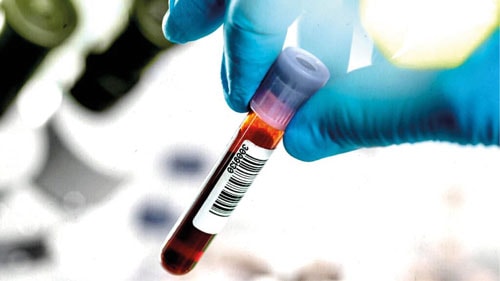Early diagnosis of lung cancer has associations with an increased likelihood of survival. Low dose com-puted tomography (low dose CT scans) is the rec-ommended screening test for lung cancer, but it has a high false-positive rate. Researchers in China have now developed a rapid blood test for screening early-stage lung cancer. This test measures the levels of specific lipids in the blood, has a low false-positive rate, and could improve the detection of early-stage lung cancer. The test can run 24 blood samples at a time and has potential use for large-scale screening.
Researchers at Peking University People’s Hospital in China have developed a rapid and reliable blood test to detect early-stage lung cancer. Early detection of lung cancer has associations with better treatment options and survival rates, but current screening techniques for lung cancer often produce low accuracy results. The novel noninvasive test, named Lung Cancer Artificial Intelligence Detector (LCAID), assesses the levels of lipid biomarkers in plasma samples. The high accuracy of this test sug-gests that it could be potentially deployed in combi-nation with current screening techniques to improve the detection of early-stage lung cancer. The study’s lead author Jun Wang, chief of the Department of Thoracic Surgery at Peking University Peoples Hospital, told Medical News Today: “The accuracy and high specificity of LCAID might help improve the detection and screening of lung cancer and con-sequently reduce unnecessary exposure to radiation and invasive diagnostic procedures. Notably, most patients with lung cancer included in this study were at Stage I, and over 90% of them were correctly classified by LCAID.”The research describing the development and validation of this new test appears in Science Translational Medicine. Early detection of lung cancer ung cancer is the leading cause of death due to cancer, accounting for nearly 25%Trusted Source of all cancer deaths in the United States.
Early detection of lung cancer before it metasta-sizesTrusted Source, or spreads, can substantially improve a person’s chances of treatment and sur-vival. For instance, according to the American Lung Association, around 56% of lung cancer patients have a chance of survival at 5 years after diagnosis when the tumor is localized to the lungs.
In contrast, individuals with distant tumors that have spread to tissue beyond the lungs have a 5-year survival rate of only 5%. Low dose computed tomo-graphy (low dose CT scans), the recommended test for lung cancer screening, has associations with a reduction in mortality but often results in the misdi-agnosis of healthy individuals.










